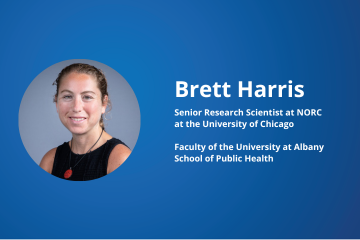Brett Harris
40 Under 40 Class of 2019
Albany, New YorkDirector of Public Health Initiatives
Suicide Prevention Office, New York State Office of Mental HealthBOLD SOLUTION: Brett developed content and prevention strategies to link the issues of both suicide prevention and substance use prevention so that communities and providers can easily access resources to improve health outcomes.
Five Questions for Brett

Brett at the finish of the Big George Half Ironman, posing with a picture of herself on the swim course during a previous year’s race.
1. Who or what inspired you to enter the field of public health?
My father’s poor health during my childhood inspired me to enter the field of public health. My dad passed away when I was only 12 years old, and he was in poor health for as long as I can remember. He had diabetes, cirrhosis resulting from contracting Hepatitis through a faulty blood transfusion, and trouble walking. He saw many doctors, but none were able to help him. After he died, I wanted to be a doctor to help people like him. It was not until much later – partway through college – that I decided I wanted to pursue a career in public health rather than medicine. In fact, I had never heard of public health until a medical ethics course I took that devoted one class to public health.
When I looked further into it, I realized that more upstream prevention measures would have helped my dad. He worked too much and did not exercise or eat right. Throughout my master’s program and about two years into my professional career, I became passionate about nutrition and obesity prevention. Though I do not currently work in that area, exercise and good nutrition are a part of my daily life, and I am passionate about marathon running and triathlons.
2. What is one of your most interesting projects?
One of my most interesting current projects is a focus group project with college and university students to learn more about help-seeking behaviors and access to and utilization of on- and off-campus mental health services and resources. As principal investigator, I put together a team of public health graduate interns and a co-investigator to carry out this project. Focus groups have already been conducted with undergraduates, public health graduate students, LGBTQ+ students, and student athletes, and we are in the process of expanding the project to medical students. What is particularly rewarding is that the information we are gaining from this project has resulted in immediate impact and is being used to identify training needs, drive resource allocation, and make campus policy changes.
As a public health professional in a leadership position, I have the privilege to oversee multiple staff. One of the most rewarding parts of my job is to work with and witness the success of these staff, their professional growth, and the positive outcomes that result from their work.
3. What are the greatest challenges you face in your work?
The greatest challenges I face in my suicide prevention work are stigma, fear, and providing services for all demographic and at-risk groups. There is a stigma attached to suicide that is difficult to defray. It is taboo and a topic that many do not want to discuss. It is also scary for clinicians, leading them not to address it and letting at-risk individuals fall through the cracks. My colleagues and I do our best to persuade health systems to adopt suicide safer care and to get them access to training that will increase their comfort and confidence in identifying and treating individuals at risk for suicide without fear of liability.
In addition, there are specific groups of people with unique risk factors such as Latina adolescents, people who identify as LGBTQ+, black youth, middle-aged white men, and individuals in rural communities for whom we must develop programming but often lack the capacity in funding and staffing to do so.
4. What would success in public health look like to you?
Success in public health would be increasing access to affordable health, mental health, and social services to everyone across demographic, racial/ethnic, and cultural groups and providing them with the education and primary, secondary, and tertiary prevention programming they need to live happy, healthy, and productive lives. It would also be reducing the stigma associated with mental health, having mental health treated just as other health conditions are treated, and increasing our capacity to help others in need through empathy, kindness, and compassion. Finally, success would be reducing discrimination – both in general and in health care – so that historically marginalized groups have access to high quality programs, services, and care.
5. Describe yourself in three words.
Strategic, driven, competitive.

